广州版七年级英语下Unit1知识点总结(可供期末、期中、平时复习) (1)
2019-2020广州七年级下册英语U1-U8语法归纳大全
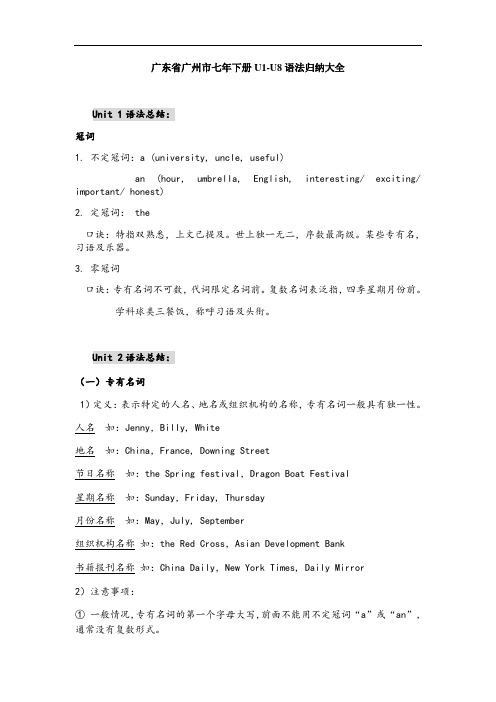
广东省广州市七年下册U1-U8语法归纳大全Unit 1语法总结:冠词1. 不定冠词:a (university, uncle, useful)an (hour, umbrella, English, interesting/ exciting/ important/ honest)2. 定冠词: the口诀:特指双熟悉,上文已提及。
世上独一无二,序数最高级。
某些专有名,习语及乐器。
3. 零冠词口诀:专有名词不可数,代词限定名词前。
复数名词表泛指,四季星期月份前。
学科球类三餐饭,称呼习语及头衔。
Unit 2语法总结:(一)专有名词1)定义:表示特定的人名、地名或组织机构的名称,专有名词一般具有独一性。
人名如:Jenny,Billy, White地名如:China,France, Downing Street节日名称如:the Spring festival,Dragon Boat Festival星期名称如:Sunday,Friday, Thursday月份名称如:May,July, September组织机构名称如:the Red Cross,Asian Development Bank书籍报刊名称如:China Daily,New York Times, Daily Mirror2)注意事项:① 一般情况,专有名词的第一个字母大写,前面不能用不定冠词“a”或“an”,通常没有复数形式。
Eg:Beijing is the capital of China.② 有时专有名词可以转化成普通名词,转化后它具有普通名词的特性,可以在其面前加不定冠词“a”也可以在词尾加表示复数形式的“s”。
Eg:A Mr Green called just now.③ 姓氏是专有名词,一般情况下,没复数形式,前面也不能加定冠词“the”。
但如果姓氏前面加定冠词“the”,并后面加上“s”时。
则表示“一家人”(其谓语用复数)。
2019-2020广州七年级下册英语U1-U8语法归纳大全 (1)
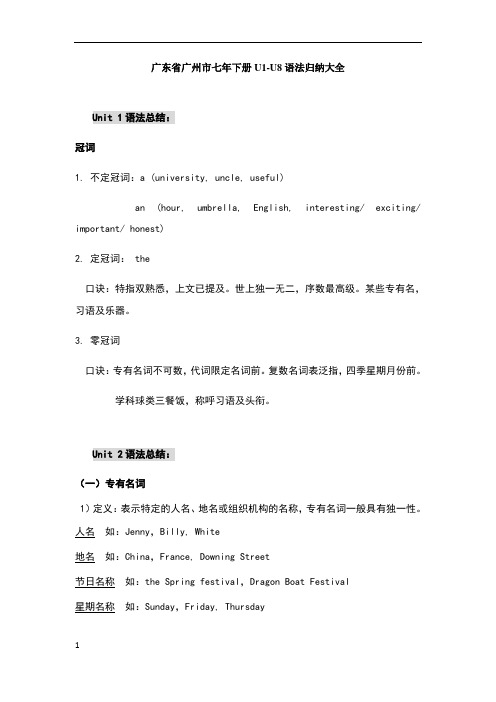
v1.0 可编辑可修改广东省广州市七年下册U1-U8语法归纳大全Unit 1语法总结:冠词1. 不定冠词:a (university, uncle, useful)an (hour, umbrella, English, interesting/ exciting/ important/ honest)2. 定冠词: the口诀:特指双熟悉,上文已提及。
世上独一无二,序数最高级。
某些专有名,习语及乐器。
3. 零冠词口诀:专有名词不可数,代词限定名词前。
复数名词表泛指,四季星期月份前。
学科球类三餐饭,称呼习语及头衔。
Unit 2语法总结:(一)专有名词1)定义:表示特定的人名、地名或组织机构的名称,专有名词一般具有独一性。
人名如:Jenny,Billy, White地名如:China,France, Downing Street节日名称如:the Spring festival,Dragon Boat Festival星期名称如:Sunday,Friday, Thursday月份名称如:May,July, September组织机构名称如:the Red Cross,Asian Development Bank书籍报刊名称如:China Daily,New York Times, Daily Mirror2)注意事项:① 一般情况,专有名词的第一个字母大写,前面不能用不定冠词“a”或“an”,通常没有复数形式。
Eg:Beijing is the capital of China.② 有时专有名词可以转化成普通名词,转化后它具有普通名词的特性,可以在其面前加不定冠词“a”也可以在词尾加表示复数形式的“s”。
Eg:A Mr Green called just now.③ 姓氏是专有名词,一般情况下,没复数形式,前面也不能加定冠词“the”。
但如果姓氏前面加定冠词“the”,并后面加上“s”时。
则表示“一家人”(其谓语用复数)。
初中英语七年级下学期Unit 1知识点总结

初中英语七年级下学期Unit 1知识点总结
本文档总结了初中英语七年级下学期Unit 1的知识点。
以下是该单元的主要知识点和要点:
1. 问候与介绍:
- 研究常见的问候语和回答,如"Hello!"、"Hi!"、"How are you?"等。
- 研究自我介绍的方式,如"My name is..."、"I'm from..."等。
2. 询问和表达个人信息:
- 研究询问他人的个人信息,如姓名、年龄、国籍等。
- 研究回答关于自己的个人信息,如"I'm 13 years old."、"I'm from China."等。
3. 熟悉学校和教室:
- 研究教室内常见的物品和设施,如黑板、桌子、椅子等。
- 研究询问和回答关于学校和教室的问题,如"What's in the classroom?"等。
4. 数字和日常时间表达:
- 研究基本的数字表达,如1-10的英文表达。
- 研究表达日常时间,如表达点钟和整点的方式。
5. 研究词汇和短语:
- 研究与以上知识点相关的词汇和短语,包括问候语、个人信息、教室用品等。
这些是初中英语七年级下学期Unit 1的主要知识点和要点。
通过掌握这些知识,学生可以更好地进行日常英语的交流和表达。
以上总结仅供参考,希望能对你的研究有所帮助!。
七年级下学期Unit1知识点归纳

七年级下学期Unit1知识点归纳七年级下学期的英语课程中,Unit1是一个很重要的单元。
这个单元主要介绍了日常生活中常用的英语表达方式。
在这个单元中,学生需要学习很多知识点,如动词、名词、形容词等。
本文将对Unit1的主要知识点进行归纳和总结,以帮助学生提高英语学习的效率。
Unit1的主要知识点如下:1. 动词:在这个单元中,学生将会学习一些日常生活中常用的动词,如eat、drink、walk、run、talk等。
这些动词是每个学生在英语学习中都应该掌握的基础知识,因为它们可以帮助学生表达自己的思想和感受,同时也可以帮助学生理解他人的意思。
2. 名词:名词在英语中是非常重要的一部分,因为它们可以帮助我们清楚地表达自己的意思。
在Unit1中,学生将会学习一些日常生活中常用的名词,如food、water、park、city等。
学生需要注意这些名词的复数形式和单数形式,以便在使用时不出现错误。
3. 形容词:形容词在英语中也是很重要的一部分。
在Unit1中,学生将会学习一些日常生活中常用的形容词,如big、small、long、short、tall等。
学生需要注意这些形容词的比较级和最高级形式,以便在使用时不出现错误。
4. 介词:介词在英语中是连接词和名词、代词之间的词语,其功能是表示时间、地点、方向、方式等。
在Unit1中,学生将会学习一些常见的介词,如in、on、at、to、from等。
这些介词对于学生理解整个句子的意思非常重要。
5. 数词:在Unit1中,学生还将会学习一些日常生活中常用的数词,如one、two、three等。
这些数词可以帮助学生快速地表达出数量信息,如购买的东西数量等。
6. 疑问句和肯定句:在Unit1中,学生还将会学习一些常用的疑问句和肯定句。
疑问句是用来询问信息的句子,如What do you like?肯定句是用来表达肯定的情况和事实,如I like pizza。
总结:在Unit1中,学生需要学习动词、名词、形容词、介词、数词、疑问句和肯定句。
七年级下册英语unit1重点知识点总结

七年级下册英语unit1重点知识点总结七年级下册英语Unit 1重点知识点总结Unit 1重点学习了“Where’s your pencil?” 这个话题,主要围绕日常用品、家庭成员等进行语言学习。
本文将总结本单元的重点知识点,帮助同学们巩固掌握学习内容。
一、日常用品本单元主要学习了日常用品的英文表达。
1. 学习了常见的文具:pen(笔)、pencil(铅笔)、ruler(尺子)、eraser(橡皮)、sharpener(铅笔刀)等。
例句:- Where’s your pencil case?- It’s on the desk.2. 学习了身体部位:head(头)、shoulder(肩膀)、arm(手臂)、hand(手)、finger(手指)、leg(腿)、foot(脚)、toe (脚趾)等。
例句:- Where’s your pen?- It’s in my hand.3. 学习了家庭成员的英文表达:father(爸爸)、mother(妈妈)、sister(姐姐)、brother(弟弟)等。
例句:- Who’s that woman?- She’s my mother.二、疑问句的构成学习了构成疑问句的两种方式:1. 直接在句首加助动词或be动词构成疑问句。
例句:- Is this your eraser?- Where is your pencil case?2. 利用疑问词(what, where, who, how等)构成疑问句。
例句:- What’s your name?- Who’s that man?三、物品位置的表达学习了表达物品在哪里的有关词汇和语句。
1. Where is …? = Where’s …?例句:- Where is your pencil case? - Where’s your book?2. It’s on / in / under + 名词例句:- Where’s your dictionary?- It’s in my bag.4. There is / are …例句:- Is there a pen in your pencil case? - Are there any books on the desk?四、注意事项1. 名词单数变复数例句:- pencil → pencils- book → books2. 对话中的语气句子最后需要加上问号。
七年级下unit1知识点总结

七年级下unit1知识点总结本篇文章将围绕七年级下Unit1的课程内容,总结其中的重点知识点,以便学生们在学习和复习中更好地掌握这些知识。
一、名词名词是英语语法中的基础知识,也是七年级下Unit1的最基础课程之一。
名词分为可数名词和不可数名词,可数名词还包括单数和复数两种形式。
在学习名词时需要掌握以下几点:1.可数名词的单数变复数规则:一般在单数名词末尾加 -s 或 -es ;有些名词变化不规则,需要背诵。
比如box变为boxes,child变为children。
2.不可数名词的用法:不可数名词只有单数形式,不能加 -s 或-es ,也不能与数字一起使用。
例如: information, furniture, advice 等。
3.名词的用途:名词不仅仅用于指代一些具体的事物,也可以用来表示抽象概念。
例如:happiness、knowledge和reliability等。
二、冠词冠词是修饰名词的词语,包括不定冠词a/an和定冠词the。
在使用冠词时需要注意以下几点:1.定冠词the的用法:指特定的人、物或者事情。
例如:The girl is dancing.定冠词也可以用来表示一类事物,比如:the piano 指所有的钢琴。
2.不定冠词a和an的用法:a用于以辅音字母开头的名词前,an用于以元音字母开头的名词前。
例如:a book, an apple。
3.不使用冠词:当名词被用作一般名词时,不需要使用冠词。
例如:I like music.三、动词动词是英语语法中最重要的知识点之一。
在七年级下Unit1的学习中,需要掌握以下几点:1.动词的用法:动词用于表示一个人或者物体所进行的动作,或者表示状态。
例如:read, play, walk, run等。
2.现在时态:英语中最基本的时态就是现在时态,包括一般现在时和现在进行时。
一般现在时用于表示经常发生的事情,现在进行时用于表示正在进行的动作。
3.动词的不规则变化:部分动词在不同时态和不同人称下发生不规则变化,需要逐个记忆。
七年级下册英语unit1知识点归纳

七年级下册英语unit1知识点归纳七年级下册英语unit1主要涉及到人称代词、一般现在时、疑问句、数量词、情态动词的用法等知识点。
以下是对这些知识点的详细归纳:一、人称代词人称代词是英语中一个非常基础的语法概念,掌握好人称代词的用法对于学好英语至关重要。
在七年级下册英语unit1中,我们主要学习了三类人称代词,分别是主格人称代词、宾格人称代词和物主代词。
主格人称代词包括:I、you、he、she、it、we、they我们可以用主格人称代词来代替主语,比如:I am a student. -> I is a student.She likes apples. -> She likes them.宾格人称代词包括:me、you、him、her、it、us、them 我们可以用宾格人称代词来代替宾语,比如:Tom called me. -> Tom called him.I saw her yesterday. -> I saw him yesterday.物之代词包括:mine、yours、his、hers、its、ours、theirs 我们可以用物之代词来代替名词性物主代词,比如:The book is mine. -> The book is hers.That bag is hers. -> That bag is mine.二、一般现在时一般现在时是英语中的一种基础时态,在我们的日常生活中也是应用最广泛的一种时态。
在七年级英语下册unit1中,我们主要学习了一般现在时的肯定句、否定句和疑问句的用法。
肯定句:主语+动词原形(第三人称单数需加-s)I eat breakfast every day.She watches TV in the evening.否定句:主语+do/does+not+动词原形I do not eat breakfast every day.She does not watch TV in the evening.疑问句:Do/does+主语+动词原形Do you eat breakfast every day?Does she watch TV in the evening?三、疑问句除了一般现在时的疑问句以外,在七年级英语下册unit1中我们还学习了其他一些形式的疑问句,例如:1. Wh-疑问句Wh-疑问句用来询问特定的信息,通常以wh-疑问词开头,可以用来询问时间、地点、方式、原因、状况等等。
新版广州英语七年级下册Unit1讲解与练习
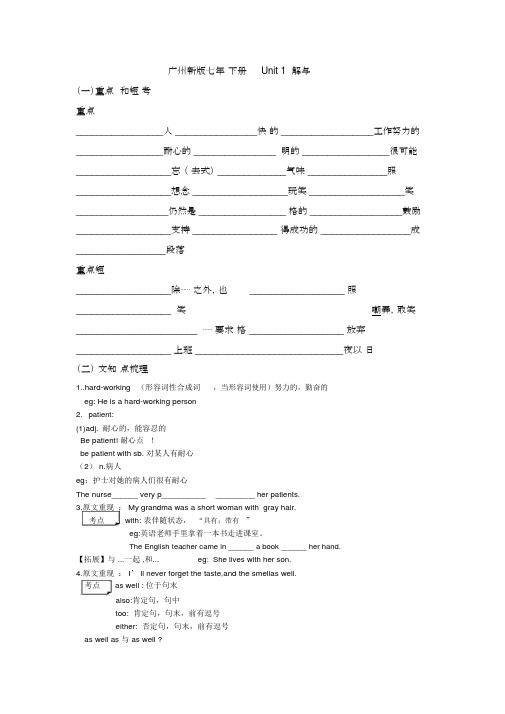
广州新版七年下册Unit 1 解与(一)重点和短考重点_________________人 ________________快的 __________________工作努力的_________________耐心的 ________________ 明的 _________________很可能__________________忘(去式) _____________气味 _______________照__________________想念 __________________玩笑 __________________笑__________________仍然是 _________________格的 __________________鼓励__________________支持 ________________得成功的 _________________成_________________段落重点短__________________除⋯⋯之外,也__________________ 照__________________ 笑嘲弄,取笑_______________________ ⋯⋯要求格 __________________ 放弃__________________ 上班 ____________________________夜以日(二)文知点梳理1..hard-working(形容词性合成词,当形容词使用)努力的,勤奋的eg: He is a hard-working person2.patient:(1)adj. 耐心的,能容忍的Be patient! 耐心点!be patient with sb. 对某人有耐心(2) n.病人eg:护士对她的病人们很有耐心The nurse______ very p__________ _________ her patients.3.原文重现: My grandma was a short woman with gray hair.考点with: 表伴随状态,“具有;带有”eg:英语老师手里拿着一本书走进课室。
七年级英语下册unit1知识点归纳
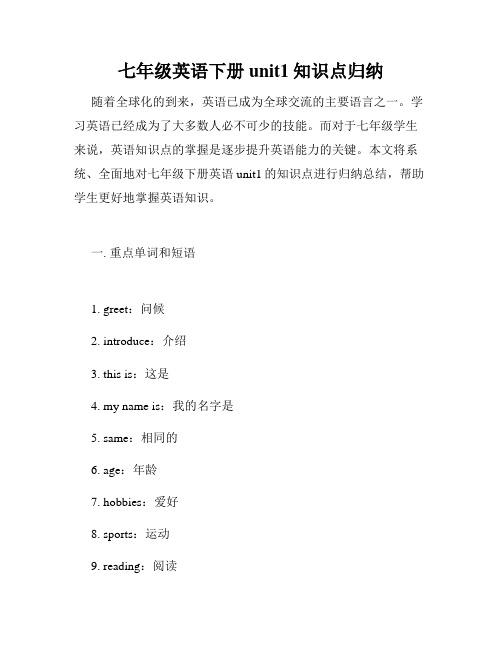
七年级英语下册unit1知识点归纳随着全球化的到来,英语已成为全球交流的主要语言之一。
学习英语已经成为了大多数人必不可少的技能。
而对于七年级学生来说,英语知识点的掌握是逐步提升英语能力的关键。
本文将系统、全面地对七年级下册英语unit1的知识点进行归纳总结,帮助学生更好地掌握英语知识。
一. 重点单词和短语1. greet:问候2. introduce:介绍3. this is:这是4. my name is:我的名字是5. same:相同的6. age:年龄7. hobbies:爱好8. sports:运动9. reading:阅读10. watching TV:看电视11. listening to music:听音乐12. playing computer games:玩电脑游戏13. making model planes:制作模型飞机14. having parties:举办聚会15. after school:放学后以上单词和短语是本单元的重点,学生可以通过对这些单词和短语的掌握,更好地理解本单元的语言环境和情境。
二、句型及用法1. How are you?:你好吗?2. I'm fine, thank you:我很好,谢谢3. What's your name?:你叫什么名字?4. My name is...:我的名字是5. Nice to meet you.:很高兴见到你。
6. This is my friend...:这是我的朋友...7. He/She is...:他/她是...8. What are your hobbies?:你的爱好是什么?9. I like...:我喜欢...10. What do you do after school?:放学后你做什么?11. I usually...:我通常会...12. But sometimes...:但有时候...掌握以上句型及其用法,可以帮助学生在真实的语言环境中更好地进行交流和表达。
广州版七年级英语下Unit1知识点总结(可供期末期中平时复习)
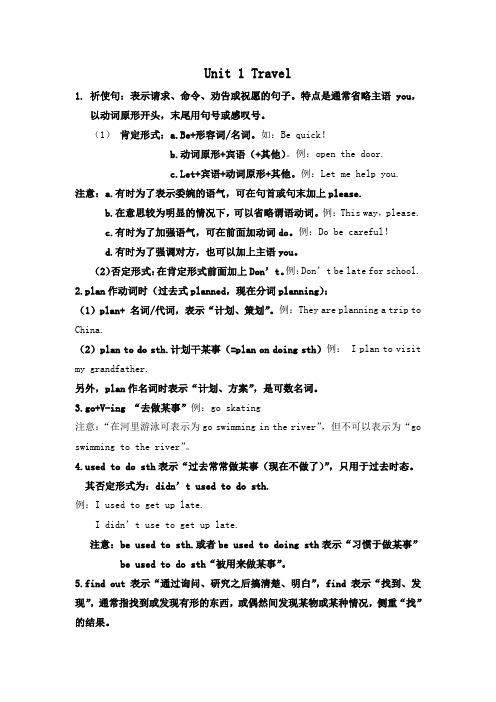
Unit 1 Travel1.祈使句:表示请求、命令、劝告或祝愿的句子。
特点是通常省略主语you,以动词原形开头,末尾用句号或感叹号。
(1)肯定形式:a.Be+形容词/名词。
如:Be quick!b.动词原形+宾语(+其他)。
例:open the door.c.Let+宾语+动词原形+其他。
例:Let me help you.注意:a.有时为了表示委婉的语气,可在句首或句末加上please.b.在意思较为明显的情况下,可以省略谓语动词。
例:This way,please.c.有时为了加强语气,可在前面加动词do。
例:Do be careful!d.有时为了强调对方,也可以加上主语you。
(2)否定形式:在肯定形式前面加上Don’t。
例:Don’t be late for school.2.plan作动词时(过去式planned,现在分词planning):(1)plan+ 名词/代词,表示“计划、策划”。
例:They are planning a trip to China.(2)plan to do sth.计划干某事(=plan on doing sth)例: I plan to visit my grandfather.另外,plan作名词时表示“计划、方案”,是可数名词。
3.go+V-ing “去做某事”例:go skating注意:“在河里游泳可表示为go swimming in the river”,但不可以表示为“go swimming to the river”。
ed to do sth表示“过去常常做某事(现在不做了)”,只用于过去时态。
其否定形式为:didn’t used to do sth.例:I used to get up late.I didn’t use to get up late.注意:be used to sth.或者be used to doing sth表示“习惯于做某事”be used to do sth“被用来做某事”。
七年级下册英语unit one知识点

七年级下册英语unit one知识点七年级下册英语Unit One 知识点Unit One 主要介绍了关于“人”,“家庭”和“爱好”的词汇和语法结构,同时还包括了一些常用的句型和表达。
接下来,我们将对Unit One的主要知识点进行详细的介绍和总结。
一、关于“人”的词汇1.人称代词在英语中,人称代词主要分为三个人称:第一人称(I,me),第二人称(you),第三人称(he,she,it,they)。
例如:I am a student.(我是一名学生。
)You are my friend.(你是我的朋友。
)He is a teacher.(他是一名老师。
)2.形容词形容词用于描述人的外貌、性格和特征等。
例如:She is beautiful.(她很漂亮。
)He is smart.(他聪明。
)They are kind.(他们很善良。
)3.职业职业是描述人们工作岗位的词汇。
例如:She is a doctor.(她是一名医生。
)He is a policeman.(他是一名警察。
)They are engineers.(他们是一些工程师。
)二、关于“家庭”的词汇1.家庭成员家庭成员是用于描述家庭成员的词汇,主要有father(父亲)、mother(母亲)和sibling(兄弟姐妹)等。
例如:My father is a businessman.(我父亲是一名商人。
)My mother is a teacher.(我母亲是一名教师。
)I have two siblings.(我有两个兄弟姐妹。
)2.描述家庭用于描述家庭的词汇主要有house(房子)、room(房间)、kitchen(厨房)和garden(花园)等。
例如:We have a big house.(我们有一座大房子。
)My room is very cozy.(我的房间很舒适。
)We cook in the kitchen.(我们在厨房里做饭。
七年级下册unit one的知识点

七年级下册unit one的知识点七年级下册的unit one主要涵盖了三个方面的知识点,即人称代词、介词以及时间状语。
以下是具体的详细介绍。
一、人称代词1.人称代词是指用来代替特定人称的词语,常用的人称代词有I、you、he、she、it、we、they等。
2.人称代词可以用来代替主语、宾语以及表语,在句中扮演不同的语法角色。
例如:I am a student.(我是学生。
)You are my friend.(你是我的朋友。
)He likes playing basketball.(他喜欢打篮球。
)She is a doctor.(她是一名医生。
)It is a book.(它是一本书。
)We are classmates.(我们是同班同学。
)They are teachers.(他们是教师。
)3.人称代词在进行时态中的使用需要注意,例如:I am reading a book.(我正在看书。
)You are playing football.(你正在踢足球。
)He is watching TV.(他正在看电视。
)She is cooking dinner.(她正在做晚饭。
)It is raining outside.(外面正在下雨。
)We are studying English.(我们正在学习英语。
)They are playing chess.(他们正在下棋。
)二、介词1.介词是指用来连接词语或句子的虚词,常用的介词有in、on、at、with、by、of、to、from、through等。
2.介词的作用主要是用来表达时间、地点、方式、原因等概念,例如:I am in the classroom.(我在教室里。
)She is studying English at home.(她在家里学习英语。
)He goes to school by bike.(他骑自行车去上学。
)They learn English from their teacher.(他们从老师那里学习英语。
七年级下册unit1英语知识点总结

七年级下册unit1英语知识点总结本篇文章主要是关于七年级下册unit1英语知识点的总结。
下面我们按照主要的学习方向,分别对unit1中要学习的基础知识点、语言点和语法进行梳理。
一、基础知识点1. 数字0-100的表达及其数学运算英语中数字0-100的表达及其数学运算是初学者必须学习的基础知识点。
在unit1中,学生需要掌握数字0-100以及它们的英语表达方式,并且熟练掌握基本的数学运算。
2. 时间表达时间是生活中必不可少的因素,因此在英语学习中也是一个重要的知识点。
学生在unit1中需要学会表达时间,包括小时、分钟和日期等。
了解时间的表达方式将有益于学生更好地与外国人交流。
3. 常见的国家名称和语言在现代社会中,国家和语言都具有重要的学习价值。
在unit1中,学生需要掌握一些常见的国家名称和语言,为今后的语言学习打好基础。
二、语言点1. 介绍人物与寻人在unit1中,学生需要学会介绍人物的基本信息。
包括名字、年龄、工作、爱好等。
此外,学生还需要学会寻找失踪者的方法和表达。
2. 谈论天气天气是人们生活中非常重要的元素。
在unit1中,学生需要学会表达天气,包括天气的描述和表达自己的事。
3. 言语礼仪在与他人交流的过程中,员工个人言行规范显得非常重要。
在unit1中,学生需要学习基本的言语礼仪技巧,如问候、表示感谢等,使自己更有礼貌、更优秀。
三、语法1. 一般现在时在unit1中,学生需要掌握一般现在时的用法和规则。
由于这是英语中最常用的时态,因此对学生的英语学习非常重要。
2. 句型结构学生需要学会一些常见的句型结构,包括主语+谓语、主语+谓语+宾语等等。
这些知识点是学习英语语言的基础,需要认真学习。
3. 情态动词情态动词是英语中的一个重要知识点,因为它可以为句子表达强制、许可、建议等情感态度。
对学生来说,掌握情态动词的用法是必不可少的。
总之,unit1是英语学习中的一个重要阶段。
通过对基础知识点、语言点和语法的学习,学生可以更好地掌握英语,从而更好地与外国人交流。
广州英语七年级第二学期unit1-4知识梳理 (1)

百度文库- 让每个人平等地提升自我!七年级第二学期(Unit 1~Unit 4)基础自测一、词汇拓展1.central(adj.)→_________(n.)中心2.relax(v.)→__________(adj.)让人放松的→_________(adj.)(人)感到放松的3.limited(adj.)→_________(v.)限制→_________(n.)限制,限度4.interview(v.)→_________(n.)采访→_________(n.)采访者5.danger(n.)→_________(adj.)危险的→_________(adj.)(反义词)安全的6.reason(n.)→_________(adj.)合理的7.describe(v.)→_________(n.)描述8.disability(n.)→_________(adj.)残疾的,丧失能力的9.seriously(adv.)→_________(adj.)严重的10.explanation(n.)→_________(v.)解释;说明11.careful(adj.)→_________(adj.)(反义词)粗心的12.imagine(v.)→_________(n.)想象;设想二、短语归纳1.如今;而今2.黄昏后;天黑后3.出国_______________________4.砍掉____________________________5.关心_______________________6.出现_____________________________7.不少;相当多8.在某种程度上_____________________9.确保10.关掉(开关)____________________11.take part in ... 12.from place to placemunicate with____________ 14.do one’s best to... _________15.stop ... from doing ... _______ 16.in one’s opinion___________17.be connected to_____________ 18.on the safe side___________19.answer the telephone___________ 20.lean out of___________要点聚焦一、词汇精讲1.send n. 文化课文:When we go abroad on holiday, we often send postcards to our friends at home.当出国度假时,我们经常给国内的朋友们寄明信片。
广州市七年级下英语期末知识点总复习
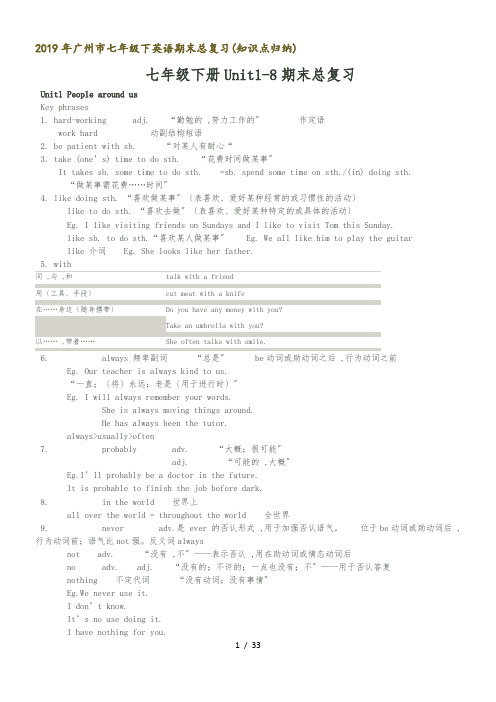
2019年广州市七年级下英语期末总复习(知识点归纳)七年级下册Unit1-8期末总复习Unit1 People around usKey phrases1. hard-working adj. “勤勉的 ,努力工作的〞作定语work hard 动副结构短语2. be patient with sb. “对某人有耐心“3. take (one’s) time to do sth. “花费时间做某事〞It takes sb. some time to do sth. =sb. spend some time on sth./(in) doing sth.“做某事需花费……时间〞4. like doing sth. “喜欢做某事〞〔表喜欢、爱好某种经常的或习惯性的活动〕like to do sth. “喜欢去做〞〔表喜欢、爱好某种特定的或具体的活动〕Eg. I like visiting friends on Sundays and I like to visit Tom this Sunday.like sb. to do sth.“喜欢某人做某事〞Eg. We all like him to play the guitarlike 介词Eg. She looks like her father.5. with同 ,与 ,和talk with a friend用〔工具、手段〕cut meat with a knife在……身边〔随身携带〕Do you have any money with you?Take an umbrella with you?以…… ,带着……She often talks with smile.6. always 频率副词“总是〞be动词或助动词之后 ,行为动词之前Eg. Our teacher is always kind to us.“一直;〔将〕永远;老是〔用于进行时〕〞Eg. I will always remember your words.She is always moving things around.He has always been the tutor.always>usually>often7. probably adv. “大概;很可能〞adj. “可能的 ,大概〞Eg.I’ll probably be a doctor in the future.It is probable to finish the job before dark.8. in the world 世界上all over the world = throughout the world 全世界9. never adv.是 ever 的否认形式 ,用于加强否认语气。
七年级下册unit1知识点总结

七年级下册unit1知识点总结七年级下册Unit 1知识点总结本文主要对七年级下册Unit1中的主要知识点进行总结和整理,方便同学们进行复习和巩固。
1. 介绍自己和他人在这个单元中,我们学习了如何介绍自己和他人。
在介绍自己时,我们可以说出自己的姓名,年龄,性别,国籍和职业等信息。
当介绍他人时,我们可以说出他人的姓名,年龄,性别和职业等信息。
2. 询问和回答基本信息在日常生活中,我们常常需要询问他人的基本信息,如电话号码,邮箱地址,家庭住址等。
在这个单元中,我们学习了如何询问和回答基本信息。
比如,当我们需要询问一个人的电话号码时,可以用以下句子:What’s your telephone number?或者Can you tell me your telephone number, please?对方回答时,可以使用以下回复:My telephone number is 135****8006.或者Sure, my telephone number is 135****8006.3. 描述人和事物在日常生活中,我们需要描述人和事物。
在这个单元中,我们学习了如何用形容词和副词来描绘人和物的特点和特征。
比如,当我们要描述一个人时,可以使用以下句子:She is tall and slim.He has short hair and wears glasses.4. 数字和时间表达在这个单元中,我们学习了如何表达数字和时间。
数字表达是我们日常生活中必不可少的一部分,我们可以用数字来表达年龄,电话号码,数量等等。
另外,在这个单元中,我们还学习了如何表达时间。
比如,我们可以使用以下句子来询问时间:What time is it now?或者Can you tell me the time, please?对方回答时,可以使用以下回复:It is 3 o'clock.或者It’s half past four.5. 交通工具和方向在这个单元中,我们学习了如何询问和描述交通工具和方向。
七年级英语下册unit1知识点总结
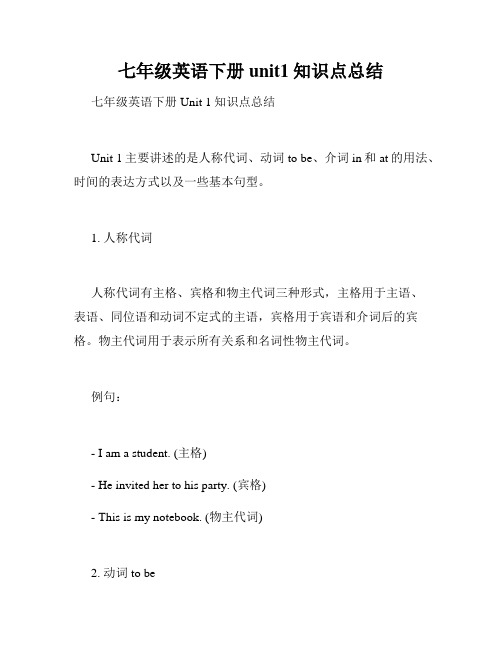
七年级英语下册unit1知识点总结七年级英语下册Unit 1知识点总结Unit 1主要讲述的是人称代词、动词to be、介词in和at的用法、时间的表达方式以及一些基本句型。
1. 人称代词人称代词有主格、宾格和物主代词三种形式,主格用于主语、表语、同位语和动词不定式的主语,宾格用于宾语和介词后的宾格。
物主代词用于表示所有关系和名词性物主代词。
例句:- I am a student. (主格)- He invited her to his party. (宾格)- This is my notebook. (物主代词)2. 动词to be动词to be是英语中最基本的动词之一,表示“是、在、有”等意思。
根据主语的不同人称和数形式,动词to be要进行相应的变化。
例句:- I am a student. (一般现在时)- He was sick yesterday. (一般过去时)- They will be at home tomorrow. (一般将来时)3. 介词in和at的用法in和at都是时间和地点的介词,但是它们的用法略有不同。
in用于指一段时间、季节和年代等长时间段,而at则用于具体的时间点、位置和事件。
例句:- We have English class in the morning. (时间段)- Sarah was born in 2005. (年代)- We will have a party at 7pm. (具体时间点)4. 时间的表达方式时间可以通过以下方式来表达:- 数字:例如1, 2, 3等数字,表示几点钟。
- AM和PM:AM表示上午,PM表示下午或晚上。
- 词语:例如morning, afternoon, evening, night等。
- 固定表达方式:例如at noon, at midnight等。
例句:- It's 3 o'clock in the afternoon. (数字)- I usually get up at 7am. (AM)- We had dinner in the evening. (词语)- The movie will start at midnight. (固定表达方式)5. 基本句型英语中常见的句型有肯定句、否定句、一般疑问句和特殊疑问句。
- 1、下载文档前请自行甄别文档内容的完整性,平台不提供额外的编辑、内容补充、找答案等附加服务。
- 2、"仅部分预览"的文档,不可在线预览部分如存在完整性等问题,可反馈申请退款(可完整预览的文档不适用该条件!)。
- 3、如文档侵犯您的权益,请联系客服反馈,我们会尽快为您处理(人工客服工作时间:9:00-18:30)。
初一1.祈使句:表示请求、命令、劝告或祝愿的句子。
特点是通常省略主语you,以动词原形开头,末尾用句号或感叹号。
(1)肯定形式:a.Be+形容词/名词。
如:Be quick!b.动词原形+宾语(+其他)。
例:open the door.c.Let+宾语+动词原形+其他。
例:Let me help you.注意:a.有时为了表示委婉的语气,可在句首或句末加上please.b.在意思较为明显的情况下,可以省略谓语动词。
例:This way,please.c.有时为了加强语气,可在前面加动词do。
例:Do be careful!d.有时为了强调对方,也可以加上主语you。
(2)否定形式:在肯定形式前面加上Don’t。
例:Don’t be late for school.2.plan作动词时(过去式planned,现在分词planning):(1)plan+ 名词/代词,表示“计划、策划”。
例:They are planning a trip to China.(2)plan to do sth.计划干某事(=plan on doing sth)例: I plan to visit my grandfather.另外,plan作名词时表示“计划、方案”,是可数名词。
3.go+V-ing “去做某事”例:go skating注意:“在河里游泳可表示为go swimming in the river”,但不可以表示为“go swimming to the river”。
ed to do sth表示“过去常常做某事(现在不做了)”,只用于过去时态。
其否定形式为:didn’t used to do sth.例:I used to get up late.I didn’t use to get up late.注意:be used to sth.或者be used to doing sth表示“习惯于做某事”be used to do sth“被用来做某事”。
5.find out表示“通过询问、研究之后搞清楚、明白”,find表示“找到、发现”,通常指找到或发现有形的东西,或偶然间发现某物或某种情况,侧重“找”的结果。
例:You should find out the answer for yourself.你应该自己去弄明白答案。
I found my watch under my chair.我最后在我的椅子下找到了手表。
6.look like 看起来像 be like 像……一样例:He looks like his father.他看起来像他的父亲。
What’s the weather like today?7. (1)like“喜欢”(=love,用法也一样),用法:A . like sth.喜欢……例:She likes shopping.B. like to do sth.喜欢做某事(指一时的喜欢,以前不一定喜欢),例:I like to go walking.我喜欢不行。
(以前可能喜欢在家中,不出来步行)C .like doing sth喜欢做某事(一直都喜欢),例:My mother likes reading very much.(2)enjoy“喜欢,享受…….的乐趣.”,用法:enjoy sth. 喜欢/享受做某事enjoy sth/doing sth 喜欢/享受做某事例:He enjoys listening to music.他喜欢听音乐。
He is enjoying music.他正陶醉在音乐中。
enjoy oneself= have a good fun=have a good time玩得开心8. (1)It is+adj.+ (for sb)to do sth.(某人)做某事是…….的。
例:It is hard( for me) to learn English.(我)学习英语很困难。
(2)it另一个用法是表示“天气、时间、距离”等,例:It is raining.外面正在下雨。
9.take、spend 、cost 、pay的用法都可以表示“花费”,但用法却不尽相同。
A.spend的主语必须是人,常用于以下结构:(1) spend time /money on sth. 在……上花费时间(金钱)。
例:I spent two hours on this maths problem. 这道数学题花了我两个小时。
(2) spend time /money (in) doing sth. 花费时间(金钱)做某事。
例:They spent two years (in) building this bridge. 造这座桥花了他们两年时间。
(3)spend money for sth. 花钱买……。
例:His money was spent for books. 他的钱用来买书了。
cost的主语是物或某种活动,还可以表示“值”,常见用法如下:(1)sth. costs (sb.) +金钱,某物花了(某人)多少钱。
例:A new computer costs a lot of money. 买一台新电脑要花一大笔钱。
(2)(doing) sth. costs (sb.) +时间,某物(做某事)花了(某人)多少时间。
例:Remembering these new words cost him a lot of time. 他花了大量时间才记住了这些单词。
注意:cost的过去式是costtake后面常跟双宾语,常见用法有以下几种:(1)It takes sb. +时间+to do sth. 做某事花了某人多少时间。
例:It took them three years to build this road. 他们用了三年时间修完了这条路。
(2)(doing) sth. takes sb. +时间,做某事花了某人多少时间。
例:Repairing this car took him the whole afternoon. 他花了一下午修车。
pay的基本用法是:(1) pay (sb.) money for sth. 付钱(给某人)买……。
例:I have to pay them 20 pounds for this room each month. 我每个月要付20英磅的房租。
(2)pay for sth. 付……的钱。
例:I have to pay for the book lost. 我不得不赔丢失的书款。
9. (1) talk about 讲(谈论,交谈)例:Please don't talk about it in front of the children.请不要当著孩子们谈论那事.(2)talk of 谈到或谈起某事, 谈论,议论例:They like talking of the News.他们喜欢喜欢谈及那则新闻。
(3)talk to 对某人说话例:Don't talk to me about that person.别跟我谈起那个人。
(4)talk with 和...交谈例:I'd like to talk with you.我想和你谈谈。
10.speak、talk、say、tell的用法区别(常在完型、单项中出题):(1)speak 强调单方的“说”或“讲”,一般用作不及物动词,要表示“对某人说(某事)”,可用 speak to sb (about sth)。
如:Please speak more slowly. 请说慢一点。
I spoke to the chairman about my idea. 我跟主席说了我的想法。
(2)talk 强调双方“交谈”如:He was talking to a friend. 他在同一位朋友谈话。
(3)say 强调说话内容,一般用作及物动词。
表示“对某人说”,可用 say to sb。
如:Did you say anything (to him)? 你(对他)说了些什么?He said (that) he wanted to go. 他说他想去。
(4) tell 表示“告诉”,例: I told him my name. 我把名字告诉了他。
11.be crowded with 被挤满……的12.(1)want+名词,表示“要/想要/想获得……”例:Do you want some tea?(2) want to do sth,表示“想做……”例:I want to go to Canada?13. make的用法:(1)make +宾语+名词,“把某事物……”.例:Most pop singers make music their career.大多数流行歌手把音乐当作他们的职业。
(2)make +宾语+do sth,“让……做……”例:The teacher made him stay after school.老师让他放学以后留下。
(3)make+宾语+形容词,“让某事物……”例:Internet makes our lives easy and convenient.互联网使我们的生活变得容易和方便。
14.hope to do sth希望做某事hope+从句,希望……hope for sth,希望得到……注意:不能说hope sb to do sth例:I hope to go to Beijing.I hope that you will come back soon.I hope for your help.15.interested表示“感兴趣的”,常用于短语be interested in中,表示“对某事物感兴趣”。
interesting则表示“令人感兴趣的”例:I am interested in the story.我对这个故事感兴趣。
(指人对事物感兴趣)It’s an interesting story.这是个有趣的故事。
(指故事本身有趣)excited与exciting也有类似的用法,excited常用于短语be excited about,表示“对……感到兴奋”。
